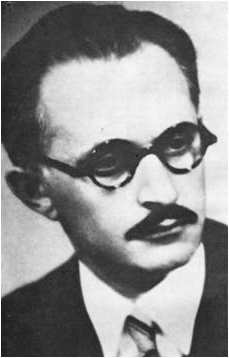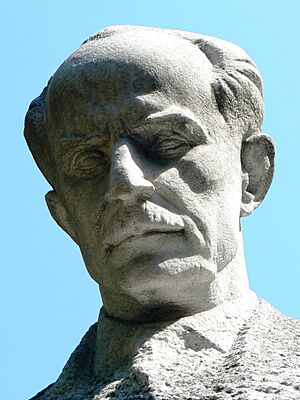Dimitar Talev facts for kids
Quick facts for kids
Dimitar Talev
|
|
|---|---|

Dimitar Talev (1930s)
|
|
| Born | 1 September 1898 Prilep, Ottoman Empire |
| Died | 20 October 1966 (aged 68) Sofia, Bulgaria |
| Occupation | journalist, editor, writer |
| Nationality | Bulgarian |
| Genres | story, novel |
| Subjects | history, politics, national liberation struggles, people's psychology |
| Literary movement | Realism |
| Years active | 1917–1966 |
| Spouse | Irina Taleva |
| Children | Bratislav Talev Vladimir Talev |
| Signature | |
 |
|
Dimitar Talev (Bulgarian: Димитър Талев) was a famous Bulgarian writer and journalist. He was born on September 1, 1898, and passed away on October 20, 1966. Talev is best known for his historical novels that tell stories about Bulgarian history and the lives of ordinary people.
Contents
Who Was Dimitar Talev?
Dimitar Talev was born in Prilep, a town that was part of the Ottoman Empire at the time. Today, Prilep is in North Macedonia. He finished high school in Bitola.
Talev studied many different subjects. He explored medicine and philosophy in cities like Zagreb and Vienna. Later, he focused on Slavic studies at Sofia University in Bulgaria, finishing in 1925.
His Work as a Journalist
After his studies, Dimitar Talev became a journalist. He worked as a managing editor for the Macedonia newspaper. He also contributed to and edited the Zora newspaper. His work in journalism helped him share his ideas and stories with many readers.
A Writer's Challenges and Triumphs
In 1944, during a time of big political changes, Dimitar Talev faced some difficulties. He was held in prison and later sent to special camps. He was also removed from the Bulgarian Writers' Union. For a few years, from 1948 to 1952, he had to live away from his home in Lukovit.
Later, the government changed, and Talev was recognized as someone who had been treated unfairly. He was allowed to return home and his membership in the writers' union was given back. He even became a member of its main board. The government honored him with three awards for his writing in 1959, 1963, and 1966. In 1966, he was also elected as a Member of Parliament.
A special place in Antarctica is named after him. The Talev Glacier on Graham Land honors Dimitar Talev's legacy.
His Famous Books
Dimitar Talev published his very first story in 1917. It appeared in a newspaper called "Rodina" (which means Motherland) in Skopje. He continued to publish his writings in newspapers and magazines both in Bulgaria and other countries.
His first book, "The Tears of my Mother," came out in 1925. This book was a collection of stories and tales written especially for children.
Novels You Might Enjoy
Dimitar Talev is most famous for his novels. Many of them tell important historical stories.
- Arduous Years (Bulgarian: Усилни години)
- The Iron Candlestick (Bulgarian: Железният светилник) (1952)
- Ilinden (Bulgarian: Илинден) (1953)
- Kiprovets Arose (Bulgarian: Кипровец въстана) (1954)
- The Bells of Prespa (Bulgarian: Преспанските камбани) (1954)
- Samuil (Bulgarian: Самуил)
- I Hear Your Voices (Bulgarian: Гласовете ви чувам) (1966)
Short Stories and Collections
Besides his long novels, Talev also wrote many shorter stories. These were often collected into books.
 | Calvin Brent |
 | Walter T. Bailey |
 | Martha Cassell Thompson |
 | Alberta Jeannette Cassell |


